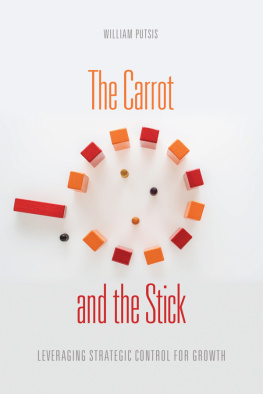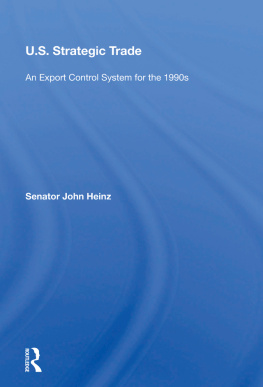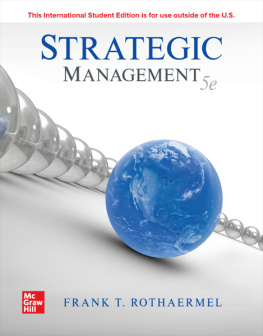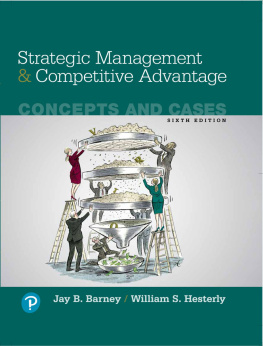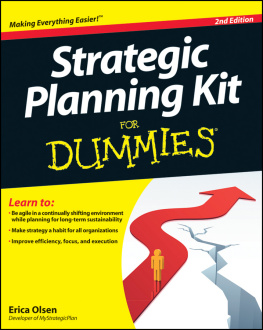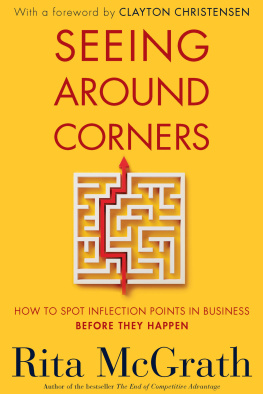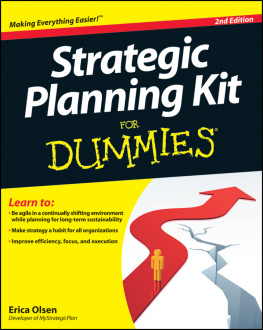
ADVANCE PRAISE FOR THE CARROT AND THE STICK
This book is a must-read if you want to compete and win in the markets of today and tomorrow. Success requires understanding how to think in both win-lose and win-win ways. William Putsis lays out a rigorous framework with clever real-world examples to help understand how sustainable profits depend upon ownership of strategic points of control and win-win incentives along the value chain.
Ravi Dhar, Director, Yale Center for Customer Insights, George Rogers Clark Professor of Management and Marketing, Yale University
After reading The Carrot and the Stick, you will start to look at everyday situations differently. William Putsis provides a compelling narrative across industries and time periods showing how considering strategic control points can swing business outcomes. William Putsiss role as a strategic advisor to many global brand-name corporations allows him to go beyond what would otherwise be theory and academic and connect it to the practitioner.
Michael Lohnert, Managing Director, Boeing HorizonX Ventures
I especially appreciated that The Carrot and the Stick did not `talk at me with a series of lessons, but through simple exercises guided me to explore and discover what will make our own unique businesses more valuable. Providing more than just the `what and the why, William Putsis most importantly lays out the `how of executing a value creation strategy based on building critical importance to customers.
Terry Theodore, Partner, Center Rock Capital Partners
In his first book, Compete Smarter, Not Harder, William Putsis presents a process to strategically prioritize market opportunities. In The Carrot and the Stick, he follows up on this by extending the concept of strategic control to multiple market opportunities. We have found his process to be instrumental to the success we have been having in growing our markets and to our move to adjacent market opportunities. Highly recommend the book to anyone interested in growing their business.
Keith E. Williams, President, Chief Executive Officer, and Trustee, Underwriters Laboratories Inc.

University of Toronto Press 2020
Rotman-UTP Publishing
University of Toronto Press
Toronto Buffalo London
utorontopress.com
Printed in Canada
ISBN 978-1-4875-0165-5 (cloth)ISBN 978-1-4875-1369-6 (EPUB)
ISBN 978-1-4875-1368-9 (PDF)
Library and Archives Canada Cataloguing in Publication
Title: The carrot and the stick : leveraging strategic control for growth / William Putsis.
Names: Putsis, William, 1959 author.
Description: Includes bibliographical references.
Identifiers: Canadiana 20190172886 | ISBN 9781487501655 (hardcover)
Subjects: LCSH: Strategic planning. | LCSH: Business planning.
Classification: LCC HD30.28 .P88 2019 | DDC 658.4/012dc23
Excerpts from Introduction, The Consequences of Betrayal, and Android Everywhere from DOGFIGHT: HOW APPLE AND GOOGLE WENT TO WAR AND STARTED A REVOLUTION by Fred Vogelstein. Copyright 2013 Fred Vogelstein. Reprinted by permission of Farrar, Straus and Giroux and Allen Lane Canada, a division of Penguin Random House Canada Limited. All rights reserved. Any third party use of this material, outside of this publication, is prohibited. Interested parties must apply direction to Farrar, Straus and Giroux and Penguin Random House Canada Limited for permission.
University of Toronto Press acknowledges the financial assistance to its publishing program of the Canada Council for the Arts and the Ontario Arts Council, an agency of the Government of Ontario.
In memory of my parents, who always taught me the importance of learning
Contents
Figures
Tables
We so often spend our time thinking about how we can move the pieces on the chessboard to our advantage when what we really need to be doing is moving the board...
A New Moment in History
This is arguably the most exciting time ever to be in business. We are experiencing sweeping changes worldwide that are affecting business today in ways that we have never seen before and providing once-in-a-lifetime business opportunities. Furthermore, the speed and magnitude of the changes are unprecedented the dissemination of information via the internet has fundamentally changed the way firms compete and win. To illustrate, contemplate the following:
In less than five years, RIM (now BlackBerry) went from having a higher market share of the smartphone market than Apple and Samsung combined to a market share of less than 1 percent. Such rapid change is unprecedented.
The Renaissance and the Industrial Revolution. Michelangelo, da Vinci, Vanderbilt, and Rockefeller
We look back on periods of expansion like the Renaissance or the Industrial Revolution and imagine them as exciting times with world-expanding possibilities wherein giants of culture and titans of industry changed our world. As Bill Gates once said, We always overestimate the change that will occur in the next two years and underestimate the change that will occur in the next ten. Today, the pace of change is so fast that its hard to overestimate .
At some point in the future, people will look back on today and view this as the greatest period of expansion and opportunity in the history of the planet and a time like no other in the world of business. To understand why, think back to the early days of the internet and the dot.com period of the late 1990s. The claim then was that the internet would transform our lives, and instant communication (e.g., email) would transform our productivity. However, while many have indeed worked harder with 24/7 connectivity, the impact on innovation, productivity, and opportunity often hasnt mirrored the hope and the hype.
Interconnectedness. Ubiquity. Always on. Mobility
One of the central reasons is that applications and users were often stand alone. For example, when we used to create a Microsoft Word file and email it to a colleague, we often needed to do it while chained to an Ethernet-wired desk; similarly, while we may have calculated forecasts using an Excel spreadsheet or SAS database, the data werent linked to other parts of the production process. Thus, our work, at our desk, wasnt fully available in real time.
The combination of interconnectedness, ubiquity, always on, and mobility today has brought multiple devices, forms of production, platforms, and huge data/analytical capabilities together to fundamentally transform business in ways we have never seen before and probably will never see again in our lifetimes. This is a time when someone in a remote village can write an app that becomes a multimillion-dollar business, and a student writing code in a dorm room can become one of the richest people on the planet. The industrial internet, sensors, interoperable devices in our homes and factories, advanced robotics, artificial intelligence, and 3D printers are just starting to transform the nature of production, distribution, finance, and business strategy. To illustrate, we are expected to have more than 50 billion connected devices in 2020,
Jobs, Zuckerberg, Musk, Bezos, Brin, Schmidt, Gates
Google was once just a search engine; however, now it is poised to be dominant elsewhere in internet advertising, mobile phones, television, internet provision, and maps, for example. We no longer exclusively book hotel rooms through the usual hotel brands but rent rooms or private apartments from Airbnb; we no longer hail taxis but rent rides from companies such as Uber or Lyft; and we increasingly rent cars as we need them, by the hour, through companies like Zipcar. Olli, an offering by Local Motors, will even pick you up (like Uber) in a driverless bus powered by IBMs Watson and the list goes on. Just think about the fact that Uber, the worlds largest taxi company, owns no vehicles. Facebook, the worlds most popular media owner, creates no content. Alibaba, the most valuable retailer, has no inventory. And Airbnb, the worlds largest accommodations provider, owns no real estate.
Next page
